Discover the Wonders of Wulongkou Macaque Reserve: A Nature Lover’s Paradise
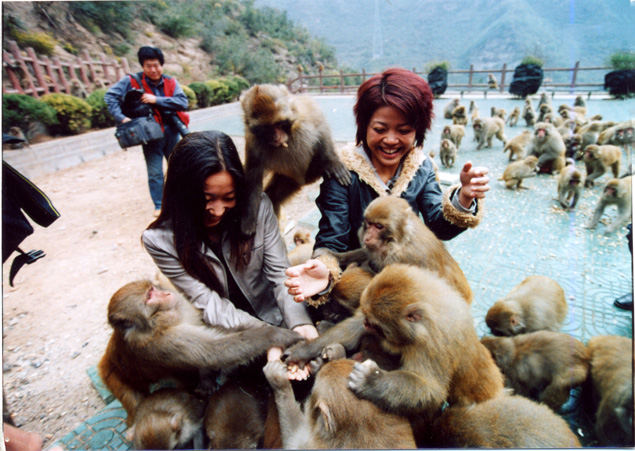
An Essential Guide to Visiting Wulongkou Macaque Reserve
In This Guide
- An Essential Guide to Visiting Wulongkou Macaque Reserve
- The Rich History and Legends of Wulongkou Macaque Reserve
- Main Highlights: What You Absolutely Can’t Miss
- Planning Your Visit: A Practical Guide
- Tickets: Prices, Booking, and Tips
- How to Get There: A Complete Transportation Guide
- Local Cuisine and Accommodation Nearby
- Frequently Asked Questions
- Final Thoughts on Your Trip
Nestled at the southern foothills of the majestic Taihang Mountains lies the enchanting Wulongkou Macaque Reserve, a haven where nature’s beauty intertwines with rich cultural history. Renowned for its large population of wild Taihang macaques, this national reserve offers an unparalleled opportunity to observe these playful creatures in their natural habitat. With over 3,800 macaques frolicking through the dense, verdant forests, it’s no wonder Wulongkou has earned the affectionate title of “China Monkey Mountain.”
As you embark on your journey through this scenic area, prepare to be captivated not only by the lively antics of the macaques but also by the breathtaking landscapes that surround you. From the serene meandering of the Qin River to the awe-inspiring peaks of the Taihang Mountains, the vistas here are nothing short of postcard-perfect. Alongside its natural splendor, Wulongkou is steeped in history, featuring remnants of ancient hydraulic engineering dating back to the Qin Dynasty, and cultural relics like the tranquil Pangu Temple that echo tales of yore.
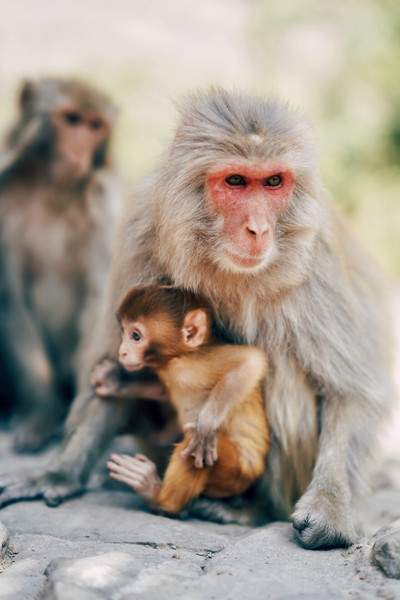
Wulongkou Macaque Reserve.
Whether you’re an avid hiker looking to explore the winding trails, a family eager to witness the daily performances of the macaques, or a history buff seeking to delve into the region’s past, Wulongkou Macaque Reserve promises an unforgettable adventure. Here’s how to make the most of your visit to this extraordinary destination.
Highlights of Your Visit
- Macaque Encounters: Experience the playful charm of the Taihang macaques up close. Observe their complex social behaviors and enjoy scheduled performances that showcase their intelligence.
- Stunning Nature Trails: Hike through lush forests and climb to vantage points that offer panoramic views of the surrounding landscape.
- Cultural Sites: Discover the historical significance of the area through ancient structures such as the Fangkou Weir, which stands as a testament to the ingenuity of ancient Chinese engineering.
- Relaxation at Hot Springs: After a day of exploration, unwind in the therapeutic waters of nearby hot spring resorts, replenishing both body and spirit.
With its harmonious blend of wildlife, stunning scenery, and rich cultural heritage, Wulongkou Macaque Reserve invites you to immerse yourself in an experience that celebrates the essence of nature and history. Prepare for an adventure that will leave you with lasting memories of both the playful macaques and the breathtaking landscapes that define this remarkable area.
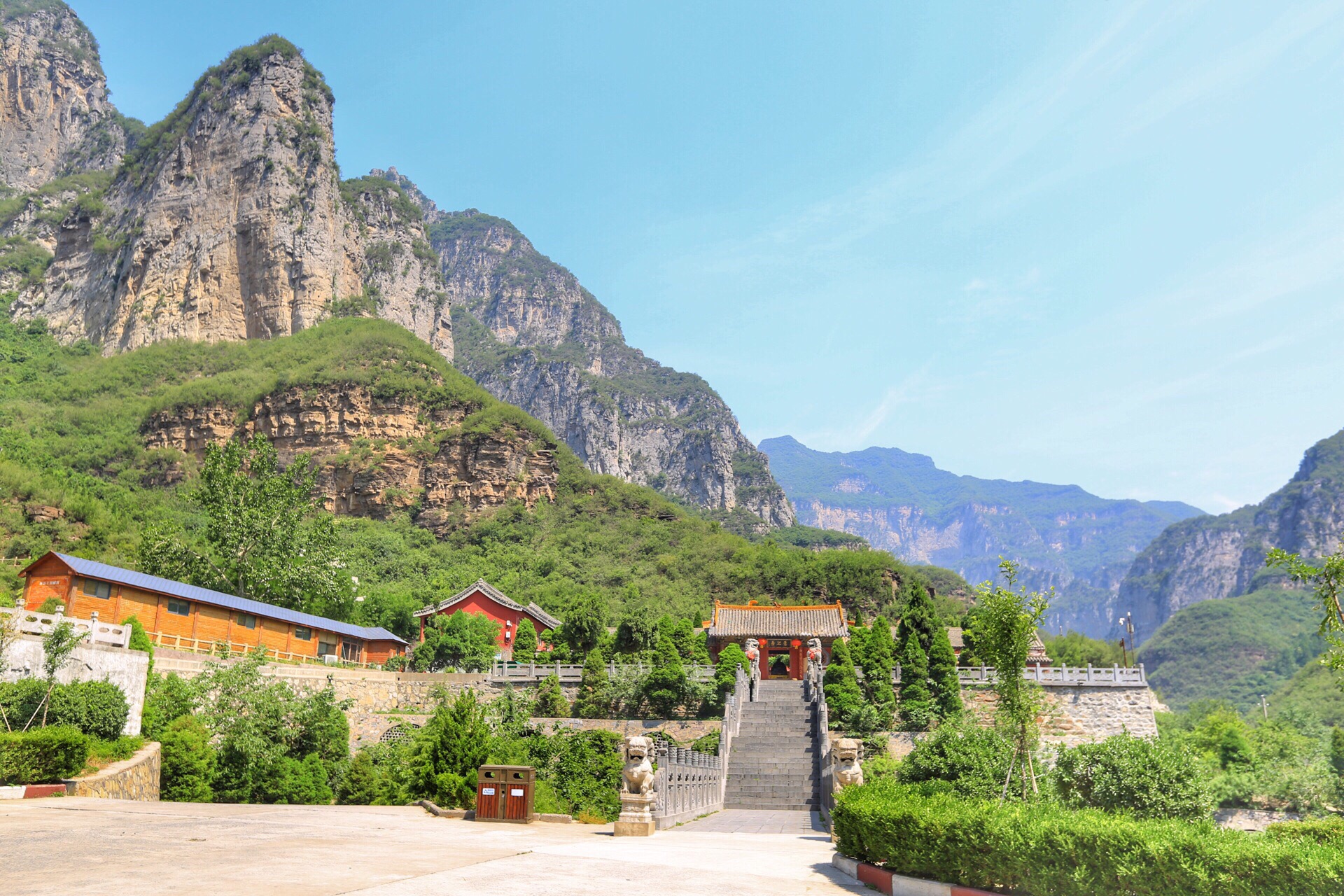
Wulongkou Macaque Reserve.
The Rich History and Legends of Wulongkou Macaque Reserve
Wulongkou Macaque Reserve, nestled at the foot of the Taihang Mountains in Jiyuan City, is not just a sanctuary for the lively Taihang macaques; it is steeped in rich history and enchanting legends that weave together nature and culture. This captivating area invites travelers to explore its multifaceted past, from ancient dynasties to the folklore that has flourished over centuries.
A Journey Through Time: Historical Significance
The history of Wulongkou dates back to the Eastern Han Dynasty, when Emperor Ming of Han, Liu Zhuang, established the Qinshui Princess Garden in this picturesque locale. This garden became a favored retreat, inspiring poetic references, including the ci tune “Qinyuanchun,” which reflects the emperor’s fond memories of the area.
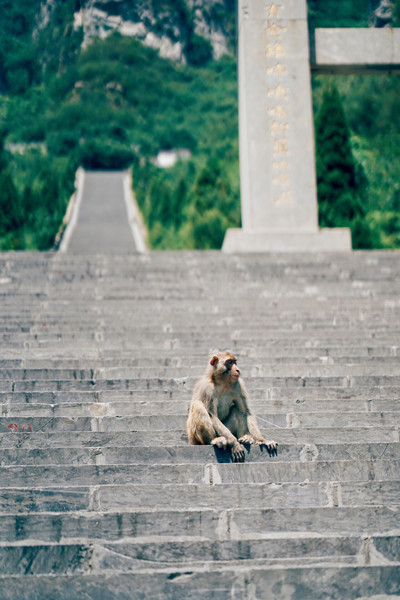
Wulongkou Macaque Reserve.
During the Qin Dynasty, Wulongkou gained prominence due to its strategic importance in water management. The region was home to the impressive Fangkou Weir, a testament to the advanced hydraulic engineering techniques of early China. This ancient water conservancy project was crucial for agriculture and settlement, showcasing the ingenuity of the Qin Dynasty’s engineers. Today, remnants of these ancient structures whisper tales of a time when water was life, and the harmony between nature and human needs was paramount.
Legends and Folklore
Wulongkou is not just defined by its historical landmarks; it is rich with legends that have captured the imaginations of locals and visitors alike. Among the most beloved tales is that of the Pangu, the legendary giant who is said to have created the world. The Pangu Scenic Area within the reserve is named after him, embodying the spirit of creation and the majesty of nature. According to folklore, Pangu’s efforts to separate the sky from the earth forged the mountains and rivers of China, including the breathtaking landscapes surrounding Wulongkou.
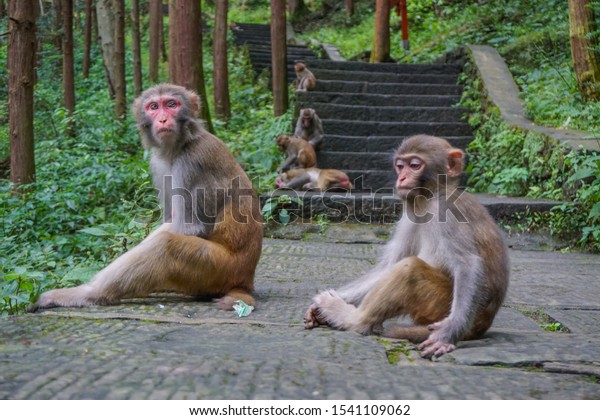
Wulongkou Macaque Reserve.
Another captivating legend involves the famous Monkey King, Sun Wukong, from the classic Chinese novel Journey to the West. The macaques of Wulongkou are often associated with this legendary figure, embodying his playful spirit and intelligence. Visitors are treated to delightful performances that showcase the macaques’ antics, reminiscent of the Monkey King’s mischievous nature. This connection to folklore enhances the magical atmosphere of the reserve, inviting guests to immerse themselves in stories that transcend time.
Cultural Heritage and Scenic Wonders
The scenic area consists of five distinct attractions—Pangu, the Qin River, Chouer Valley, Baijiangou, and the Hot Spring area—each contributing to the rich tapestry of Wulongkou’s heritage. The natural beauty of deep gorges and towering peaks harmonizes with cultural relics like the ancient temples, including Xiangyan Temple and Yuan Gong Temple, which echo the region’s spiritual significance. These sites not only provide a glimpse into the architectural styles of past dynasties but also serve as tranquil retreats for reflection and connection with the divine.
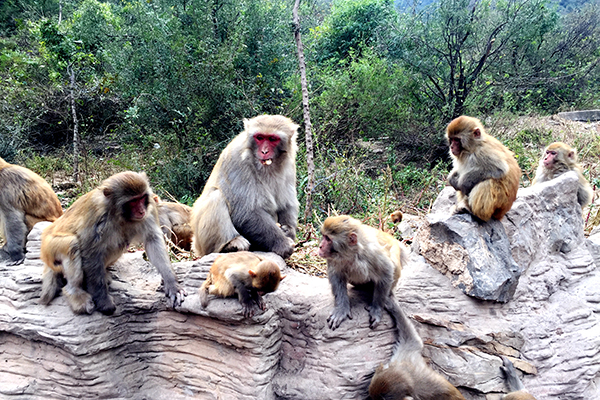
Wulongkou Macaque Reserve.
The area also boasts a legacy of artistic inspiration, being the birthplace of Jing Hao, a renowned painter of the Later Liang Dynasty. His influence on the Northern Landscape Painting School is celebrated through various exhibits, allowing visitors to appreciate the intertwining of nature and art in this historical region.
Conclusion
Wulongkou Macaque Reserve is a treasure trove of history, legends, and natural beauty. Whether you’re wandering through the lush landscapes, observing the lively macaques, or exploring the ancient relics, each experience here invites you to delve deeper into the rich cultural narrative of China. As you traverse this enchanting area, you will not only witness the beauty of the Taihang Mountains but also engage with a vibrant history that continues to inspire and captivate the hearts of all who visit.

Wulongkou Macaque Reserve.
Main Highlights: What You Absolutely Can’t Miss
Discover the Enchantment of Wulongkou Macaque Reserve
Nestled in the picturesque Wulongkou Town of Jiyuan City, the Wulongkou Scenic Area is a treasure trove for nature lovers, history enthusiasts, and families alike. This national macaque reserve, often celebrated as the “Monkey Kingdom,” offers a unique blend of stunning landscapes, intriguing cultural relics, and delightful encounters with the charismatic Taihang macaques. Here are the main highlights you simply cannot miss during your visit.
1. Encounter the Taihang Macaques
- The Monkey Kingdom: Wulongkou is home to approximately 3,800 wild Taihang macaques, making it one of the largest monkey habitats in northern China. Visitors can observe these lively creatures in their natural environment as they leap through the trees and interact with one another.
- Captivating Performances: Don’t miss the daily monkey performances where skilled trainers showcase the intelligence and agility of these remarkable animals. It’s an engaging experience for visitors of all ages.
2. Breathtaking Natural Scenery
- Majestic Landscapes: The scenic area is framed by the stunning Taihang Mountains and features deep gorges, lush forests, and the winding Qin River. Key spots include Taodu Mountain, known for its panoramic views, and Xianglu Peak, which offers breathtaking photo opportunities.
- Hiking Trails: For adventure seekers, the hiking trails wind through the stunning terrain, providing a chance to immerse yourself in the serene beauty of the area while enjoying invigorating exercise.
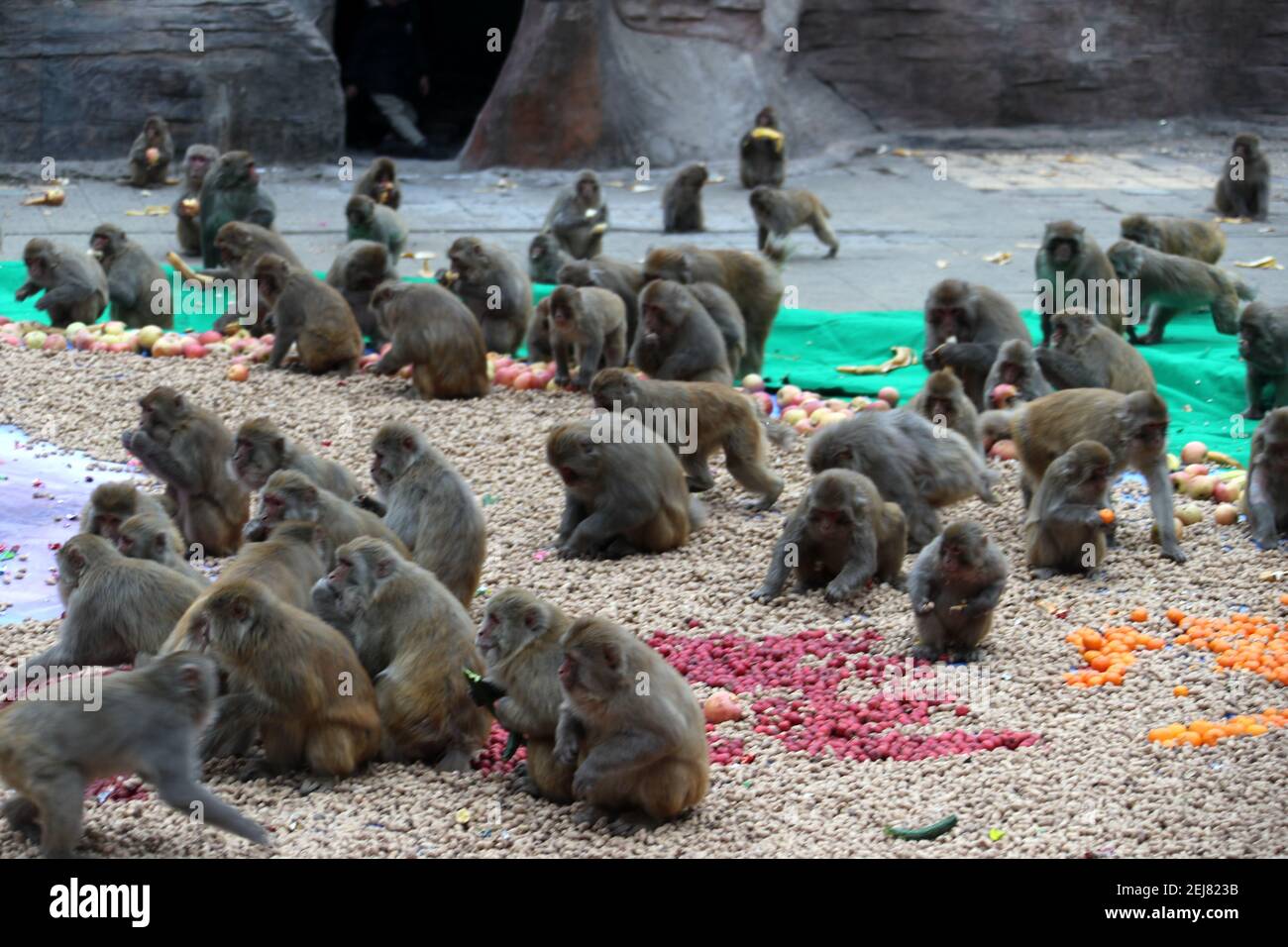
Wulongkou Macaque Reserve.
3. Relax in the Healing Hot Springs
- Therapeutic Waters: Wulongkou is renowned for its geothermal hot springs. Several resorts, such as the Wulongkou Hot Spring Resort, offer mineral-rich waters that are perfect for relaxation and therapeutic treatments. After a day of exploration, indulge in a soothing soak to rejuvenate your body and spirit.
4. Explore Cultural Relics
- Historical Significance: The area is steeped in history, with cultural sites like the Fangkou Weir, an ancient hydraulic engineering marvel from the Qin Dynasty. This impressive structure showcases the ingenuity of ancient Chinese water conservancy.
- Temples and Gardens: Visit the tranquil Pangu Temple, with its serene ambiance and historical significance, and explore the Qinshui Princess Garden, a site that echoes tales of past emperors and poets. Admire the stunning landscapes that inspired renowned figures such as Bai Juyi.
5. Unique Attractions
- Pangu Scenic Area: Start your journey here to enjoy breathtaking views and discover the local mythology surrounding Pangu, the creator of the world in Chinese folklore.
- Cao Wei Ancient Town: A glimpse into the past, this ancient town features traditional architecture and offers a window into the lives of those who lived during the tumultuous Three Kingdoms period.
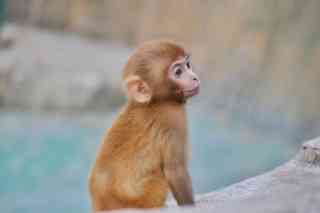
Wulongkou Macaque Reserve.
Practical Information for Visitors
- Admission Fees: Entry to the scenic area is approximately ¥50 (about $7 USD), which includes access to monkey-watching zones. Hot spring fees are separate.
- Best Time to Visit: The ideal seasons are spring and autumn when the weather is pleasant and the macaques are most active.
- Getting There: Easily accessible by car or public transportation, the reserve is about a 90-minute drive from Zhengzhou and well-connected by shuttle buses from Jiyuan city center.
Final Thoughts
Wulongkou Macaque Reserve is not just a destination; it’s an experience that offers a harmonious blend of nature, wildlife, and history. Whether you’re marveling at the playful macaques, soaking in a hot spring, or exploring ancient relics, this enchanting locale promises an unforgettable adventure in the heart of China.
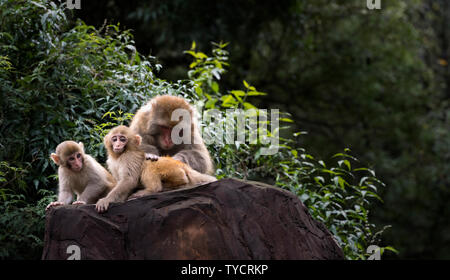
Wulongkou Macaque Reserve.
Planning Your Visit: A Practical Guide
Planning Your Visit to Wulongkou Macaque Reserve
Nestled in the heart of Jiyuan City, the Wulongkou Macaque Reserve is a treasure trove of natural beauty, rich history, and vibrant wildlife. This practical guide will help you navigate your visit to this enchanting destination, ensuring you have a memorable experience that intertwines cultural exploration with nature’s wonders.
Getting There
Location:
Wulongkou Scenic Area is easily accessible, located just 15 kilometers northeast of Jiyuan City in Henan Province.
Transportation Options:
– Self-Driving: If you prefer the flexibility of your own vehicle, take the Lianhuo Expressway from Zhengzhou or Luoyang, and transfer to the Hebao Expressway. Exit at Jiyuan East Station; the journey takes approximately 1.5 hours.
– Public Transport: For those relying on public transport, shuttle buses operate frequently from Jiyuan Bus Station to the scenic area. A ticket costs around CNY 3, making it a budget-friendly option.
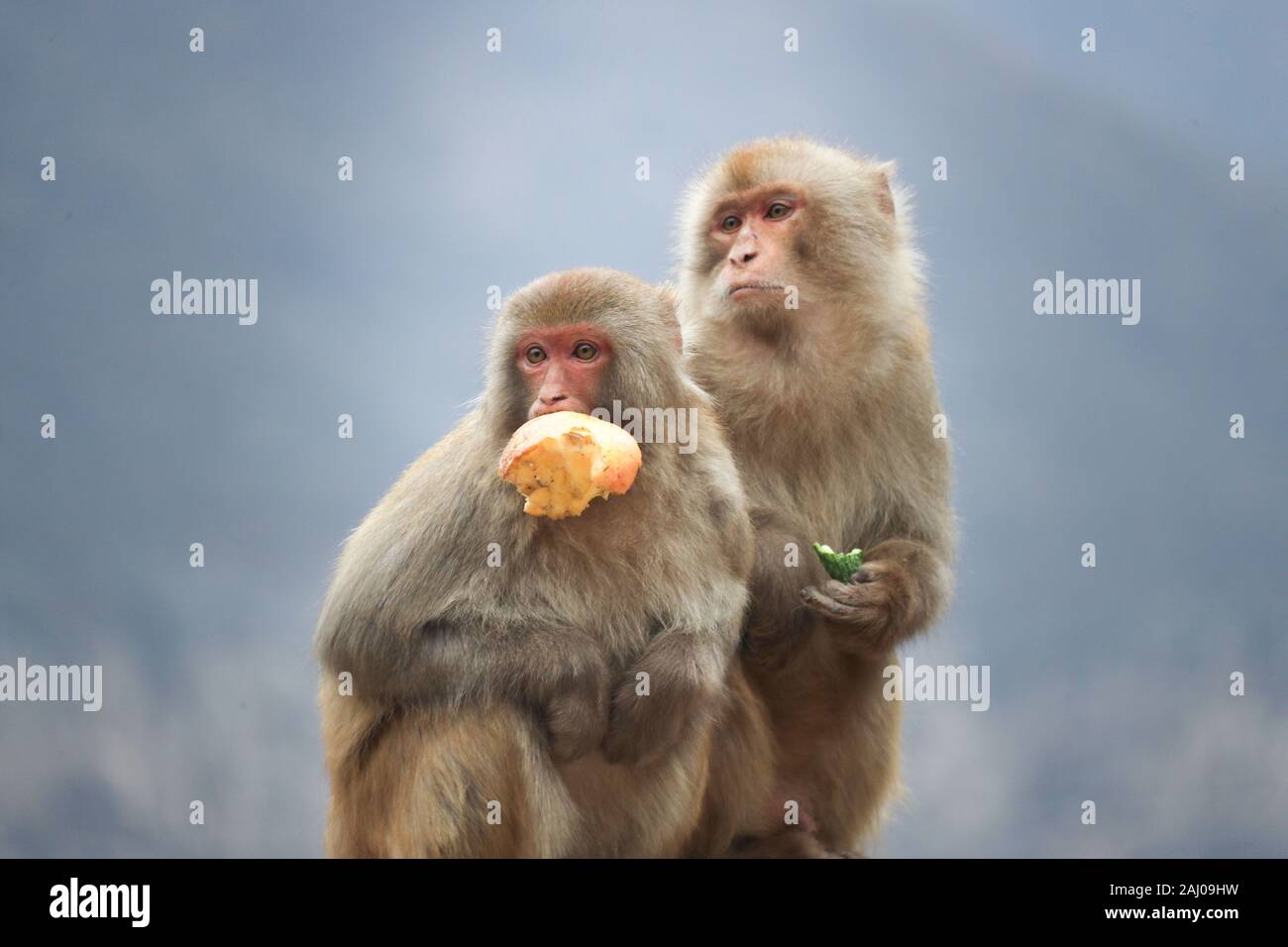
Wulongkou Macaque Reserve.
Admission and Hours
- Admission Fee: Approximately CNY 50 per person, which includes access to monkey-watching zones. Note that hot spring fees are separate.
- Opening Hours: The reserve is open daily from 8:00 AM to 5:30 PM, although seasonal changes may apply.
Recommended Duration
Plan to spend 4 to 5 hours exploring the scenic area. This allows ample time to enjoy the various attractions, partake in monkey watching, and appreciate the natural landscapes.
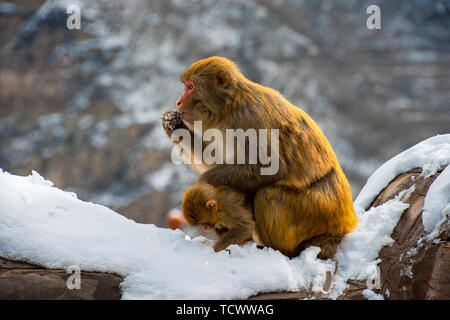
Wulongkou Macaque Reserve.
Attractions Not to Miss
-
Taihang Macaques:
The highlight of your visit! Witness the playful antics of over 3,800 wild Taihang macaques. Observing their natural behaviors in designated zones offers a unique experience. Don’t miss the daily monkey performances that showcase their intelligence and agility. -
Natural Scenery:
Marvel at the stunning landscapes at the southern foot of the Taihang Mountains. Key natural attractions include: - Taodu Mountain and Xianglu Peak for breathtaking views.
-
The Ten-Mile Gallery, a scenic hiking trail that provides panoramic vistas of the Qin River Valley.
-
Hot Springs:
After a day of hiking and monkey watching, unwind in one of the nearby hot spring resorts. The mineral-rich waters are ideal for relaxation and rejuvenation. -
Cultural Relics:
Discover the rich history of the area through its cultural sites: - Pangu Temple and its serene atmosphere.
- The Fangkou Weir, an ancient water conservancy project from the Qin Dynasty, showcasing remarkable engineering achievements.
- Cao Wei Ancient Town and the birthplace of the painter Jing Hao, where you can explore cultural exhibits and historical architecture.
Practical Tips
- Safety First: While the Taihang macaques are adorable, maintain a safe distance and avoid feeding them. Respect their space to ensure a harmonious interaction.
- Best Time to Visit: Spring and autumn are ideal for pleasant weather and active wildlife. Winter is perfect if your focus is on enjoying the hot springs.
- Photography: Bring your camera! The picturesque landscapes and playful monkeys provide endless opportunities for stunning photographs.
Conclusion
Wulongkou Macaque Reserve is more than just a scenic area; it’s a place where nature, history, and culture converge. Whether you’re hiking the trails, soaking in the hot springs, or observing the lively macaques, you’re bound to create unforgettable memories. Embrace the spirit of adventure and immerse yourself in the beauty of this remarkable destination!
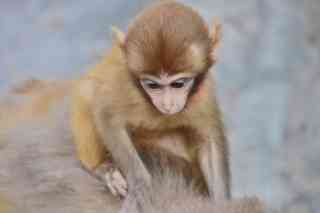
Wulongkou Macaque Reserve.
Tickets: Prices, Booking, and Tips
Ticket Information for Wulongkou Macaque Reserve
Visiting the Wulongkou Scenic Area is an enchanting experience that combines natural beauty with cultural heritage. Before embarking on your adventure, here’s all you need to know about ticket prices, booking options, and helpful tips to enhance your visit.
Admission Prices
- Standard Ticket: Approximately ¥50 (about $7.23). This ticket grants you access to the main scenic areas, including the designated macaque-watching zones.
- Hot Springs: Please note that the hot spring fees are separate and vary depending on the specific resort you choose to visit.
Booking Your Tickets
- Online Reservations: To avoid queues and ensure a smooth entry, it’s advisable to book your tickets online through popular travel platforms or the official Wulongkou Scenic Area website.
- On-site Purchase: You can also buy tickets at the entrance. However, during peak tourist seasons, this could lead to longer wait times.
Opening Hours
- Daily Hours: The Wulongkou Scenic Area is open from 8:00 AM to 5:30 PM. Be sure to check for any seasonal changes to these hours before your visit.
Transportation Options
- Self-Driving: If you’re driving from Zhengzhou or Luoyang, take the Lianhuo Expressway and transfer to the Hebao Expressway, exiting at Jiyuan East Station. The journey takes about 1.5 hours.
- Public Transport: The area is accessible via shuttle buses from Jiyuan Bus Station, with fares around ¥3. Taxis are also available for a more direct route.
Tips for Your Visit
- Best Time to Visit: Spring and autumn are ideal for pleasant weather and active macaques. If you prefer a soothing hot spring experience, winter is your best bet.
- Plan Your Route: Begin your exploration at the Pangu Scenic Area, then make your way through the Qin River, hot springs, Chou’er Gully, and Baijian Gully. This order allows you to fully appreciate the breathtaking landscapes.
- Safety First: While observing the Taihang macaques, maintain a safe distance and refrain from feeding or teasing them. These adorable creatures are best enjoyed from afar.
- Environmental Awareness: Keep the scenic area pristine by not littering and respecting the natural habitat.
Embarking on your journey to the Wulongkou Macaque Reserve promises an unforgettable blend of wildlife, history, and stunning landscapes. Enjoy your adventure!
How to Get There: A Complete Transportation Guide
Navigating Your Way to Wulongkou Macaque Reserve
Planning a visit to the enchanting Wulongkou Macaque Reserve in Jiyuan City, Henan Province? This stunning destination not only offers close encounters with the charming Taihang macaques but also immerses you in rich historical and cultural experiences. Below is a comprehensive transportation guide to help you reach this remarkable site with ease.
Getting There by Air
Nearest Airports:
– Zhengzhou Xinzheng International Airport (CGO): Located approximately 140 km (about 1.5 hours by car) from Wulongkou, this is the most convenient airport for international travelers arriving in the region.
– Luoyang Beijiao Airport (LYA): About 90 km away, this airport offers a smaller selection of flights but is closer to Jiyuan.
Transportation from the Airport:
– Car Rentals: Available at both airports, providing a flexible option for navigating the region.
– Airport Transfers: Pre-book a transfer service for a hassle-free journey directly to the reserve.
– Public Transport: Buses or taxis can be taken from the airport to Jiyuan city center, where you can transfer to local transport to reach Wulongkou.
Traveling by Train
Jiyuan City is accessible via train, making it a convenient option for those already in China.
Train Stations:
– Jiyuan Railway Station: The main station in Jiyuan, well-connected to major cities.
Getting to Wulongkou from Jiyuan Railway Station:
– Taxi: A quick taxi ride will take you to Wulongkou Scenic Area in about 30 minutes.
– Local Bus: Look for the Jiyuan-Wulongkou shuttle bus service. Buses run frequently, and the fare is approximately CNY 3.
Driving Yourself
For those who prefer the freedom of their own vehicle, driving to Wulongkou is an excellent choice.
Driving Directions:
– From Zhengzhou: Take the Lianhuo Expressway, then transfer to the Hebao Expressway, exiting at Jiyuan East Station. The total journey takes about 1.5 hours.
– From Luoyang: Follow the G312 National Road towards Jiyuan, which is approximately 1 hour’s drive.
Parking: Ample parking facilities are available at the Wulongkou Scenic Area for visitors.
Public Transportation Options
Once in Jiyuan City, accessing Wulongkou is straightforward:
- Shuttle Buses: Regular shuttle buses operate from Jiyuan Bus Station to Wulongkou. The rides are frequent and budget-friendly at about CNY 3.
- Taxis: Easily hailed throughout the city, taxis are a convenient option for direct transport to the reserve.
Best Time to Visit
The ideal seasons to explore Wulongkou are spring and autumn when the weather is pleasant, and the macaques are most active. If you’re looking to indulge in hot spring therapy, winter offers a unique experience amidst the scenic beauty.
With this guide in hand, you’re all set to embark on an unforgettable journey to the Wulongkou Macaque Reserve. Embrace the natural wonders, cultural treasures, and delightful encounters with the playful macaques that await you!
Local Cuisine and Accommodation Nearby
When visiting the enchanting Wulongkou Scenic Area, immersing yourself in the local cuisine and finding the perfect accommodation can enhance your experience significantly. This region, rich in natural beauty and cultural heritage, offers a delightful array of culinary delights and comfortable lodging options that reflect the essence of Henan Province.
Culinary Delights
Local Specialties
The flavors of Jiyuan and the surrounding areas are a testament to Henan’s diverse culinary heritage. Here are some must-try dishes:
- Jiyuan Noodles (济源面条): Known for their chewy texture, these hand-pulled noodles are often served in a savory broth with vegetables and meat, embodying the warmth of local hospitality.
- Steamed Buns (包子): These fluffy buns are filled with a variety of ingredients, including pork, vegetables, and even sweet red bean paste. They make for a delightful snack while exploring the scenic area.
- Braised Fish (红烧鱼): Freshwater fish from the nearby rivers is commonly used in this dish, simmered in a rich, flavorful sauce that reflects the local palate.
- Hot Springs Cuisine (温泉料理): Many resorts nearby offer special dining experiences featuring dishes that utilize the mineral-rich waters, enhancing flavors and promoting health benefits.
Dining Recommendations
1. Local Eateries:
– Wulongkou Hot Spring Resort Restaurant: This establishment not only offers a chance to indulge in delicious local cuisine but also allows you to relax in a hot spring setting.
– Lao Zhang’s Noodle House: A beloved spot among locals for its authentic Jiyuan noodles, served with a variety of toppings.
- Street Food Stalls: Strolling through Jiyuan, don’t miss the vibrant street food scene. Try local snacks like spicy grilled skewers and sweet potato cakes for a quick bite.
Comfortable Accommodations
Finding the right place to rest after a day of exploring is essential. Here are some recommended accommodations that blend comfort with a taste of local culture:
- Wulongkou Hot Spring Resort
- Description: This resort offers a unique blend of relaxation and adventure, featuring hot springs, spa treatments, and guided tours of the scenic area. The rooms are well-appointed, and the on-site restaurant serves local delicacies.
-
Location: Nestled within the scenic area, providing easy access to hiking trails and monkey-watching zones.
-
Jiyuan City Hotel
- Description: A modern hotel offering comfortable rooms with stunning views of the Taihang Mountains. The hotel features a restaurant that serves a mix of local and international cuisine, perfect for unwinding after a day of exploration.
-
Location: Centrally located, making it convenient for visiting nearby attractions and enjoying local nightlife.
-
Homestays in Wulongkou Town
- Description: For a more immersive experience, consider staying at a local homestay. These accommodations offer cozy rooms and a chance to enjoy home-cooked meals while interacting with local families.
- Experience: Engage in traditional activities and get a deeper understanding of the local culture.
Final Tips
- Reservations: It’s advisable to book your accommodation in advance, especially during peak travel seasons in spring and autumn.
- Dining Hours: Local restaurants typically serve lunch from 11:00 AM to 2:00 PM and dinner from 5:00 PM to 9:00 PM. Plan your meals accordingly to savor the best of local cuisine.
By indulging in Jiyuan’s culinary treasures and finding the right place to stay, your visit to Wulongkou Scenic Area will be both memorable and enriching. Enjoy the harmonious blend of nature, history, and delightful flavors that this beautiful region has to offer!
Frequently Asked Questions
Frequently Asked Questions about Wulongkou Macaque Reserve
1. What is the best time to visit Wulongkou Scenic Area?
The ideal times to visit Wulongkou are during the spring (March to May) and autumn (September to November) months when the weather is pleasant, and the macaques are particularly active. Winter offers a great experience for those looking to enjoy the hot springs.
2. How can I get to Wulongkou Scenic Area?
Wulongkou is easily accessible by both public and private transport:
– Self-Driving: Take the Lianhuo Expressway from Zhengzhou or Luoyang, then transfer to the Hebao Expressway, exiting at Jiyuan East Station (approximately 1.5 hours).
– Public Transport: You can take a shuttle bus from Jiyuan Bus Station or a taxi from downtown Jiyuan to reach the scenic area.
3. What are the entrance fees for the scenic area?
The admission fee for Wulongkou Scenic Area is approximately ¥50 per person, which includes entry to the macaque-watching zones. Additional fees may apply for hot spring access and other activities.
4. What activities can I enjoy at Wulongkou?
Visitors can partake in a variety of activities, including:
– Macaque Watching: Observe the fascinating behaviors of wild Taihang macaques.
– Hiking: Explore scenic trails with panoramic views, including notable peaks like Taodu Mountain.
– Hot Springs: Relax in the mineral-rich waters at nearby hot spring resorts.
– Cultural Exploration: Visit historical sites such as the Qin Dynasty’s Fangkou Weir and ancient temples.
5. Are there guided tours available?
Yes, guided tours are available, including scheduled macaque performances that showcase their intelligence and agility. These tours often provide insights into the monkeys’ behaviors and the history of the area.
6. What should I be aware of while visiting the macaque areas?
While enjoying the macaques, keep the following in mind:
– Safety First: Maintain a safe distance, and do not feed the monkeys, as this can encourage unwanted behavior.
– Respect Wildlife: Observe their natural behaviors without disturbing them.
7. What facilities are available for visitors?
Wulongkou Scenic Area is equipped with various facilities, including:
– Restrooms: Available at key locations throughout the area.
– Food and Beverage: Local snacks and refreshments are often available.
– Parking: Ample parking space for visitors who drive.
8. Are there accommodations nearby?
Yes, there are several hotels and resorts near Wulongkou Scenic Area, ranging from budget to luxury options. Staying nearby allows you to fully explore the scenic area and enjoy its attractions without the hassle of long commutes.
Final Thoughts on Your Trip
As your journey through the enchanting Wulongkou Macaque Reserve draws to a close, it’s time to reflect on the myriad experiences that this unique destination offers. Nestled in the scenic embrace of the Taihang Mountains, Wulongkou is more than just a sanctuary for the playful Taihang macaques; it is a vibrant tapestry woven from nature, culture, and history.
Embrace Nature and Wildlife
From the moment you arrived, the lush landscapes and the lively antics of the macaques have surely captured your heart. Observing these intelligent creatures in their natural habitat provides not only a delightful spectacle but also a poignant reminder of the delicate balance between humans and wildlife. As you bid farewell to this playful kingdom, take with you the memories of their joyful interactions and the stunning vistas that surround them.
Explore Cultural Riches
Wulongkou is steeped in rich history, with ancient sites like the Fangkou Weir and Pangu Temple whispering tales of China’s glorious past. Reflect on the architectural wonders that have withstood the test of time, and consider how the stories of emperors and poets echo through the ages in this serene locale. Each step you take along the scenic paths is a step through history, connecting you to the legacy of the land.
Plan Your Return
Whether you came to hike the rugged trails, soak in the healing waters of the hot springs, or simply to enjoy the vibrant flora and fauna, Wulongkou offers an abundance of experiences that beckon you back. The changing seasons bring new beauty to the landscape, each visit promising something fresh and exhilarating.
Final Thoughts
As you prepare to leave Wulongkou, let the tranquility of the mountains and the charm of the macaques linger in your mind. This is a place where nature and culture intertwine, inviting you to return and uncover more of its wonders. Carry the spirit of Wulongkou with you, and share its beauty and stories with others, inspiring them to embark on their own adventure to this captivating corner of China. Safe travels!